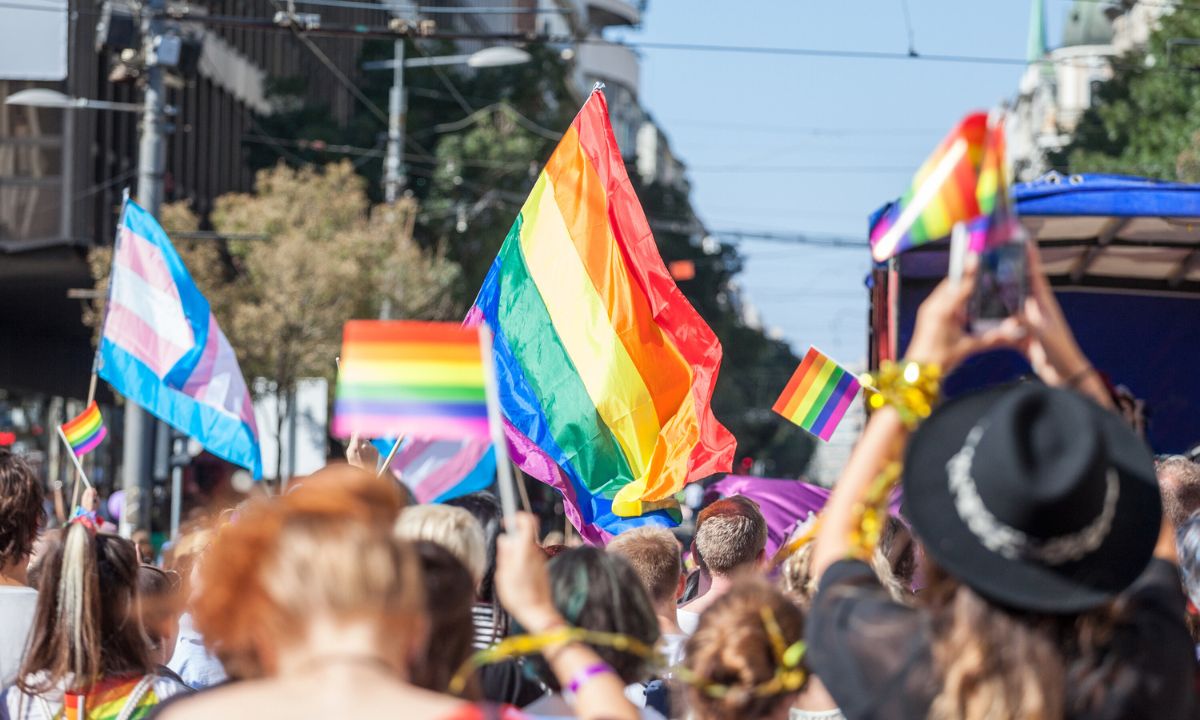America Has an Urgent Need for Safe Spaces Provided by LGBTQ-Inclusive Schools
Educator's view: In the face of discriminatory laws, schools can be beacons of hope and acceptance that benefit all students through empathy, respect.

Get stories like this delivered straight to your inbox. Sign up for The 74 Newsletter
In a classroom in the heartland of America, a young student hesitates to be seen joining their high school Gender and Sexuality Alliance Club, fearing ridicule and bullying for simply being who they are. This scene plays out daily across the nation, particularly in states where recent legislation has targeted LGBTQ+ youth. Educators, parents and community members must recognize the urgent need to create inclusive school environments for all students, regardless of their sexual orientation or gender identity.
The landscape for LGBTQ+ students in many states is becoming increasingly hostile. As of late February 2025, lawmakers in 48 states had introduced some 600 bills seeking to roll back rights or legal protections for transgender people. Last year’s entire legislative session saw a total of 641 such measures, indicating an escalating trend in bills targeting the LGBTQ+ community.
These proposed laws encompass a range of restrictions, including bans on participation by transgender students in sports teams that align with their gender identity; restrictions on gender-affirming medical treatments such as hormone therapy and puberty blockers for transgender minors; measures that deny or complicate the legal recognition of transgender individuals’ gender identities; and policies that require schools to inform parents if a student identifies as LGBTQ+, potentially exposing young people to unsupportive or hostile environments at home.
The stakes are high. According to The Trevor Project’s 2022 National Survey on LGBTQ Youth Mental Health, LGBTQ+ youth in affirming schools reported significantly lower rates of suicide attempts than those in non-affirming environments. A separate study published in the Journal of Adolescent Health demonstrated that the presence of gay-straight alliances in schools was associated with reduced suicidal ideation and attempts among both LGBTQ+ and heterosexual students.
Despite these clear benefits, the wave of anti-LGBTQ+ legislation threatens to undermine the progress that has been made. These policies don’t merely restrict; they harm. LGBTQ+ youth already face disproportionate rates of bullying, mental health challenges and social isolation. Limiting affirming spaces and discussions only compounds these challenges, leaving vulnerable students with fewer resources and less hope.
Research is unequivocal about the importance of inclusive environments. Students in supportive schools have better academic outcomes, improved mental health and lower rates of substance abuse. A study by GLSEN found that LGBTQ+ students in schools with comprehensive policies feel safer, experience less victimization, and have a greater sense of belonging. Multiple studies have also shown that LGBTQ+ students in schools with anti-bullying policies that specifically mention sexual orientation or gender identity reported less homophobic victimization and greater psychosocial adjustment over time than students in schools without such policies.
Creating these inclusive environments isn’t just beneficial for LGBTQ+ students — it enriches the educational experience for all. It teaches empathy, broadens perspectives and prepares students for a diverse world. The skills learned in an inclusive environment — respect for differences, effective communication and conflict resolution — are invaluable in any future career or personal relationship. And schools that implement these measures report better outcomes for all students.
As the socio-political climate becomes increasingly charged, it’s vital for schools to stand as beacons of safety and acceptance. They must adopt and enforce inclusive policies, provide professional development for staff on LGBTQ+ issues and support gay-straight alliances and similar student organizations. Parents and community members can play a crucial role by advocating for these measures and holding schools accountable for their implementation.
This is a call to action: to ensure that every student, regardless of identity, feels seen, heard and valued. The time to act is now. Young people are owed safe spaces where they can thrive, free from fear and filled with the promise of a brighter, more inclusive future. This mission also intersects with broader struggles for equity and justice across other marginalized identities, including racial, ethnic and socio-economic groups.
To create these inclusive spaces, especially in the face of such restrictive legislation, GLSEN offers these resources and recommendations:
- Implement comprehensive anti-bullying and anti-discrimination policies that explicitly protect LGBTQ+ students.
- Provide professional development for staff on LGBTQ+ issues and creating inclusive classrooms.
- Support student-led clubs like gay-straight alliances.
- Include LGBTQ+ history and perspectives in the curriculum, where possible.
- Display visible signs of support, such as Safe Space stickers or posters.
School is where young people spend most of their waking hours. Students worrying about bullying or hiding their true self can’t fully engage in learning. That’s why focusing on academics alone overlooks the critical role that a sense of belonging and safety plays in a student’s ability to learn. But when students feel supported and accepted for who they are, their academic and personal development flourishes.
How can educators and parents support this crucial cause? Start conversations in local communities about the importance of inclusivity by organizing public forums or joining school board meetings to advocate for inclusive policies. Collaborate with local organizations to raise awareness and foster dialogue on LGBTQ+ issues. Attend school board meetings and advocate for comprehensive policies. Support organizations like GLSEN, that provide resources and training. Seek out (demand!) professional development opportunities to better support your LGBTQ+ students.
The need for LGBTQ+ inclusive school environments is more urgent than ever. In the face of discriminatory legislation, schools can and must be a beacon of hope and acceptance. Creating these safe spaces not only improves outcomes for LGBTQ+ youth — it fosters a broader cultural and social understanding in schools, benefiting all students by cultivating empathy and mutual respect.
Get stories like these delivered straight to your inbox. Sign up for The 74 Newsletter

;)
